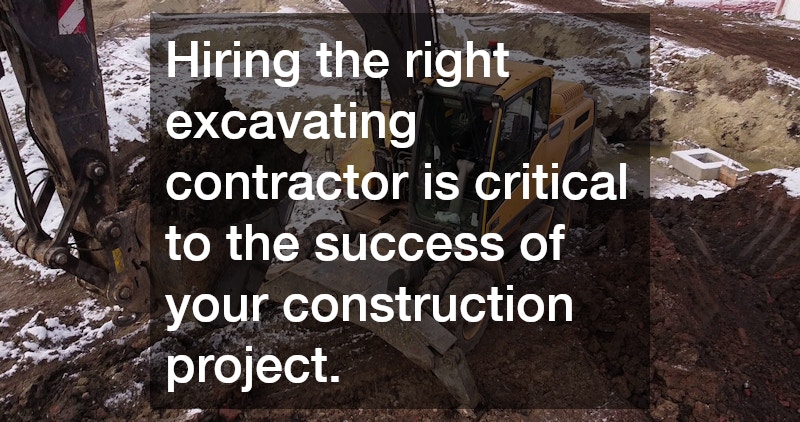How to Vet an Excavating Contractor’s Experience?
Researching Past Projects
Before hiring, inquire about the contractor’s past projects. A reputable contractor should have a portfolio of completed projects similar to yours.
Evaluating their past work gives you a glimpse into their expertise and capability. It’s vital to confirm that they have experience with projects of a similar scale and complexity.
In the construction industry, experience translates directly to reliability and proficiency. A contractor with a diverse range of projects indicates adaptability and problem-solving skills.
Checking References and Reviews
Ask for and contact references to confirm the contractor’s claims and look for online reviews to gain further insights into their reputation. Reliable references provide evidence of a contractor’s ability to meet project deadlines and specifications.
Online reviews can highlight both the strengths and weaknesses of the contractor, offering a balanced perspective. It’s crucial to consider several reviews to get a comprehensive view of the contractor’s performance.
Combining references and reviews ensures a well-rounded evaluation of the contractor. Transparency in past projects and client relationships builds trust and confidence in your choice.
What Are the Key Contractual Considerations?
Understanding the Scope of Work
Clearly outline the scope of work in the contract to avoid any misunderstandings regarding project expectations and deliverables. This documentation should include all tasks, timelines, and responsibilities of each party.
Having a detailed scope ensures that both parties are aligned on the project goals and deliverables. Any ambiguity in the contract can lead to disagreements and project delays.
The clarity in scope protects both the contractor and the client from unforeseen issues. Establishing clear benchmarks from the beginning can improve communication and efficiency throughout the project.
Reviewing Payment Terms
Ensure payment terms are detailed and agreed upon by both parties to prevent financial disputes during or after project completion. These terms should cover payment schedules, methods, and conditions for releasing funds.
Financial transparency is key to maintaining a healthy contractor-client relationship. Disputes often arise from vague payment agreements, so it’s crucial to clarify this aspect upfront.
Clear payment terms foster trust and accountability between both parties. Establishing milestones tied to payments ensures both sides remain committed to project progress.
What Regulations Should Be Aware of in Excavation Projects?
Compliance with Local Permits and Codes
Research and obtain all necessary permits and ensure the contractor complies with local building codes to avoid legal issues. Compliance demonstrates the contractor’s professionalism and commitment to industry standards.
Ensuring that all paperwork is in order allows the project to proceed without interruptions. Navigating permits and codes is often complex, requiring the expertise of experienced contractors.
Non-compliance can lead to costly fines and project shutdowns, underscoring the importance of regulatory adherence. Meticulous attention to permits and codes is a hallmark of a diligent contractor.
Safety and Environmental Standards
Verify that the contractor follows safety and environmental standards to protect your project, property, and workers. Adhering to these standards is critical to prevent incidents and ensure everyone’s well-being on-site.
Excavation involves inherent risks, making safety protocols non-negotiable. Contractors committed to safety will implement comprehensive plans to handle emergencies effectively.
Environmental considerations underscore responsible project management. Ensuring compliance with environmental standards can prevent long-term damage and uphold community goodwill.
The selection process demands diligence and attention to detail, emphasizing accountability and transparency. A thoughtful approach to hiring can pave the way for a successful and worry-free construction venture.
How to Vet an Excavating Contractor’s Experience?
Researching Past Projects
Before hiring, inquire about the contractor’s past projects. A reputable contractor should have a portfolio of completed projects similar to yours.
Evaluating their past work gives you a glimpse into their expertise and capability. It’s vital to confirm that they have experience with projects of a similar scale and complexity.
In the construction industry, experience translates directly to reliability and proficiency. A contractor with a diverse range of projects indicates adaptability and problem-solving skills.
Checking References and Reviews
Ask for and contact references to confirm the contractor’s claims and look for online reviews to gain further insights into their reputation. Reliable references provide evidence of a contractor’s ability to meet project deadlines and specifications.
Online reviews can highlight both the strengths and weaknesses of the contractor, offering a balanced perspective. It’s crucial to consider several reviews to get a comprehensive view of the contractor’s performance.
Combining references and reviews ensures a well-rounded evaluation of the contractor. Transparency in past projects and client relationships builds trust and confidence in your choice.
What Are the Key Contractual Considerations?
Understanding the Scope of Work
Clearly outline the scope of work in the contract to avoid any misunderstandings regarding project expectations and deliverables. This documentation should include all tasks, timelines, and responsibilities of each party.
Having a detailed scope ensures that both parties are aligned on the project goals and deliverables. Any ambiguity in the contract can lead to disagreements and project delays.
The clarity in scope protects both the contractor and the client from unforeseen issues. Establishing clear benchmarks from the beginning can improve communication and efficiency throughout the project.
Reviewing Payment Terms
Ensure payment terms are detailed and agreed upon by both parties to prevent financial disputes during or after project completion. These terms should cover payment schedules, methods, and conditions for releasing funds.
Financial transparency is key to maintaining a healthy contractor-client relationship. Disputes often arise from vague payment agreements, so it’s crucial to clarify this aspect upfront.
Clear payment terms foster trust and accountability between both parties. Establishing milestones tied to payments ensures both sides remain committed to project progress.
What Regulations Should Be Aware of in Excavation Projects?
Compliance with Local Permits and Codes
Research and obtain all necessary permits and ensure the contractor complies with local building codes to avoid legal issues. Compliance demonstrates the contractor’s professionalism and commitment to industry standards.
Ensuring that all paperwork is in order allows the project to proceed without interruptions. Navigating permits and codes is often complex, requiring the expertise of experienced contractors.
Non-compliance can lead to costly fines and project shutdowns, underscoring the importance of regulatory adherence. Meticulous attention to permits and codes is a hallmark of a diligent contractor.
Safety and Environmental Standards
Verify that the contractor follows safety and environmental standards to protect your project, property, and workers. Adhering to these standards is critical to prevent incidents and ensure everyone’s well-being on-site.
Excavation involves inherent risks, making safety protocols non-negotiable. Contractors committed to safety will implement comprehensive plans to handle emergencies effectively.
Environmental considerations underscore responsible project management. Ensuring compliance with environmental standards can prevent long-term damage and uphold community goodwill.
The selection process demands diligence and attention to detail, emphasizing accountability and transparency. A thoughtful approach to hiring can pave the way for a successful and worry-free construction venture.


